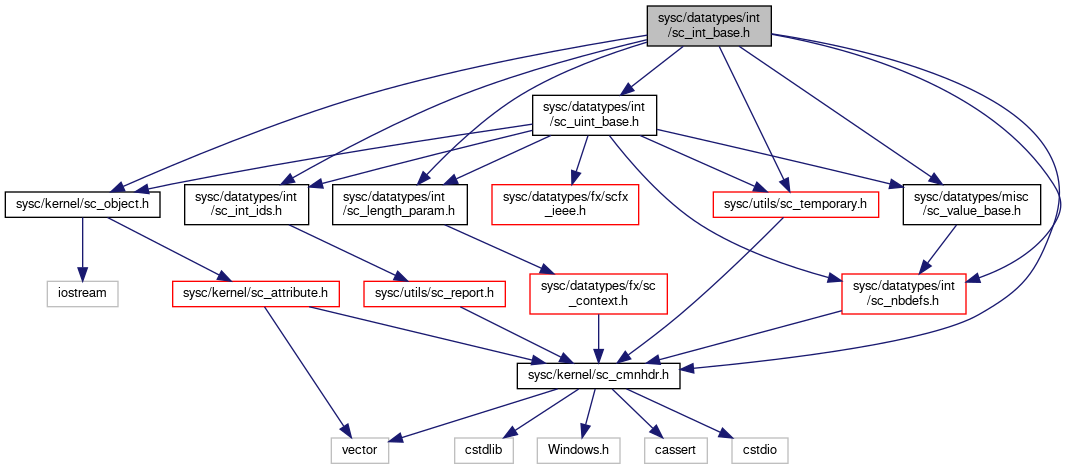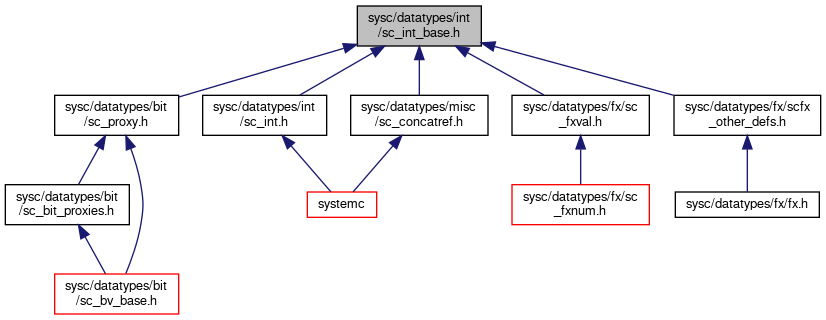sc_int_base.h File Reference
A signed integer whose length is less than 64 bit. More...
#include "sysc/kernel/sc_cmnhdr.h"#include "sysc/kernel/sc_object.h"#include "sysc/datatypes/misc/sc_value_base.h"#include "sysc/datatypes/int/sc_int_ids.h"#include "sysc/datatypes/int/sc_length_param.h"#include "sysc/datatypes/int/sc_nbdefs.h"#include "sysc/datatypes/int/sc_uint_base.h"#include "sysc/utils/sc_temporary.h"
Include dependency graph for sc_int_base.h:

This graph shows which files directly or indirectly include this file:

Go to the source code of this file.
Classes | |
| class | sc_dt::sc_int_bitref_r |
| Proxy class for sc_int bit selection (r-value only). More... | |
| class | sc_dt::sc_int_bitref |
| Proxy class for sc_int bit selection (r-value and l-value). More... | |
| class | sc_dt::sc_int_subref_r |
| Proxy class for sc_int part selection (r-value only). More... | |
| class | sc_dt::sc_int_subref |
| Proxy class for sc_int part selection (r-value and l-value). More... | |
| class | sc_dt::sc_int_base |
| Base class for sc_int. More... | |
Namespaces | |
| sc_dt | |
| sc_core | |
Functions | |
| bool | sc_dt::operator== (const sc_int_base &a, const sc_int_base &b) |
| bool | sc_dt::operator!= (const sc_int_base &a, const sc_int_base &b) |
| bool | sc_dt::operator< (const sc_int_base &a, const sc_int_base &b) |
| bool | sc_dt::operator<= (const sc_int_base &a, const sc_int_base &b) |
| bool | sc_dt::operator> (const sc_int_base &a, const sc_int_base &b) |
| bool | sc_dt::operator>= (const sc_int_base &a, const sc_int_base &b) |
| inline ::std::ostream & | sc_dt::operator<< (::std::ostream &, const sc_int_bitref_r &) |
| inline ::std::istream & | sc_dt::operator>> (::std::istream &, sc_int_bitref &) |
| inline ::std::ostream & | sc_dt::operator<< (::std::ostream &, const sc_int_subref_r &) |
| inline ::std::istream & | sc_dt::operator>> (::std::istream &, sc_int_subref &) |
| inline ::std::ostream & | sc_dt::operator<< (::std::ostream &, const sc_int_base &) |
| inline ::std::istream & | sc_dt::operator>> (::std::istream &, sc_int_base &) |
| bool | sc_dt::and_reduce (const sc_int_subref_r &a) |
| bool | sc_dt::nand_reduce (const sc_int_subref_r &a) |
| bool | sc_dt::or_reduce (const sc_int_subref_r &a) |
| bool | sc_dt::nor_reduce (const sc_int_subref_r &a) |
| bool | sc_dt::xor_reduce (const sc_int_subref_r &a) |
| bool | sc_dt::xnor_reduce (const sc_int_subref_r &a) |
| bool | sc_dt::and_reduce (const sc_int_base &a) |
| bool | sc_dt::nand_reduce (const sc_int_base &a) |
| bool | sc_dt::or_reduce (const sc_int_base &a) |
| bool | sc_dt::nor_reduce (const sc_int_base &a) |
| bool | sc_dt::xor_reduce (const sc_int_base &a) |
| bool | sc_dt::xnor_reduce (const sc_int_base &a) |
Variables | |
| SC_API const uint_type | sc_dt::mask_int [SC_INTWIDTH][SC_INTWIDTH] |
Detailed Description
A signed integer whose length is less than 64 bit.
Unlike arbitrary precision, arithmetic and bitwise operations are performed using the native types (hence capped at 64 bits). The sc_int integer is useful when the user does not need arbitrary precision and the performance is superior to sc_bigint/sc_biguint.
Original Author: Amit Rao, Synopsys, Inc.
Definition in file sc_int_base.h.
